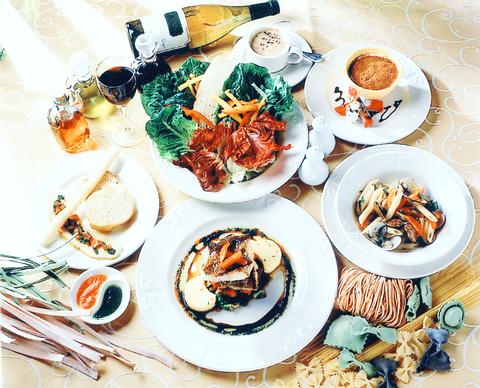Adjacent to the lobby of the Brother Hotel is this landmark's small and comfortable Viola Italian Restaurant, where at almost all hours of the day one can catch a tasty and classy meal.
The restaurant's menu is expansive, encompassing seafood, meat, pastas and pizzas and is suited to breakfast, lunch or dinner. For greater value and for the sake of simplicity, most diners will want to jump to the set menus at the back of the menu. These offer a fine balance of dishes to make up a complete meal that, in the larger sets, would be enough to fill a sumo wrestler. The large portions, however, do not mean corners are cut when it comes to taste.
The most basic set meal, for example, comes with either a soup or salad, a choice from among eight pastas and eight sauces, fruit and either coffee or tea for NT$380. Many, though not all, of the pastas are handmade on site, which ensures their freshness and exquisite texture, while the variety of sauces can suit most any taste. The restaurant's pomodoro and pesto sauces are unique in their consistency and flavor, with an emphasis on basil to the exclusion of garlic.

PHOTO COURTESY OF VIOLA ITALIAN RESTAURANT
Other set meals are more elaborate and consequently more expensive (up to NT$1,480), with choices of meat or seafood and small bowls of pasta, as well as the house specialty, tiramisu. It would take an extremely hungry person, or, two as is often the case, according to assistant manager Julia Yu (
All the elements of the set menus can be ordered a la carte for those who would like to sample the specialty main dishes but can't put down the whole set menu. Among these, the sea bass stands out in particular as a true delicacy, with tender meat seared to perfection on a bed of fresh mashed potatoes.
Being an Italian eatery there are, of course, pizzas, all of which are priced between NT$280 and NT$380. These come in seven, thin-crust varieties and the kitchen can add or remove toppings when customers have a special craving for something that may not be featured on the menu's pizzas. The restaurant also serves an assortment of Italian sandwiches for NT$180.
In its large servings and especially its heavy cream sauces and soups, Viola Italian Restaurant occasionally tends toward the grandiose to leave an impression. Provided one chooses the lighter items on the menu, however, the restaurant offers great Italian food at eminently reasonable prices.

On April 26, The Lancet published a letter from two doctors at Taichung-based China Medical University Hospital (CMUH) warning that “Taiwan’s Health Care System is on the Brink of Collapse.” The authors said that “Years of policy inaction and mismanagement of resources have led to the National Health Insurance system operating under unsustainable conditions.” The pushback was immediate. Errors in the paper were quickly identified and publicized, to discredit the authors (the hospital apologized). CNA reported that CMUH said the letter described Taiwan in 2021 as having 62 nurses per 10,000 people, when the correct number was 78 nurses per 10,000

As we live longer, our risk of cognitive impairment is increasing. How can we delay the onset of symptoms? Do we have to give up every indulgence or can small changes make a difference? We asked neurologists for tips on how to keep our brains healthy for life. TAKE CARE OF YOUR HEALTH “All of the sensible things that apply to bodily health apply to brain health,” says Suzanne O’Sullivan, a consultant in neurology at the National Hospital for Neurology and Neurosurgery in London, and the author of The Age of Diagnosis. “When you’re 20, you can get away with absolute

May 5 to May 11 What started out as friction between Taiwanese students at Taichung First High School and a Japanese head cook escalated dramatically over the first two weeks of May 1927. It began on April 30 when the cook’s wife knew that lotus starch used in that night’s dinner had rat feces in it, but failed to inform staff until the meal was already prepared. The students believed that her silence was intentional, and filed a complaint. The school’s Japanese administrators sided with the cook’s family, dismissing the students as troublemakers and clamping down on their freedoms — with

As Donald Trump’s executive order in March led to the shuttering of Voice of America (VOA) — the global broadcaster whose roots date back to the fight against Nazi propaganda — he quickly attracted support from figures not used to aligning themselves with any US administration. Trump had ordered the US Agency for Global Media, the federal agency that funds VOA and other groups promoting independent journalism overseas, to be “eliminated to the maximum extent consistent with applicable law.” The decision suddenly halted programming in 49 languages to more than 425 million people. In Moscow, Margarita Simonyan, the hardline editor-in-chief of the